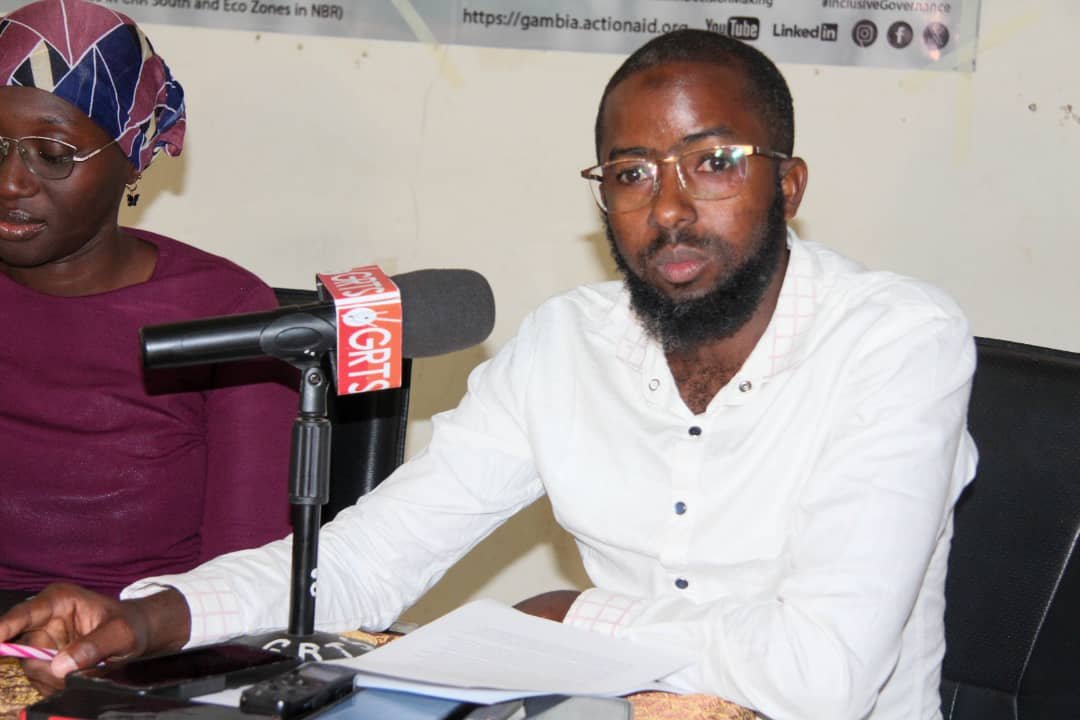ActionAid Urges Media to Amplify Youth Voices for Greater Civic Engagement
ActionAid Gambia Comms Officer Amadou Jallow © ActionAid Gambia
By Edward Francis Dalliah
Civil society advocates urged media personnel to play a pivotal role in amplifying youth voices and fostering greater civic engagement in The Gambia during a three-day training. Speaking at the opening of the transformative training in Soma, Mansakonko, ActionAid The Gambia’s Communications Coordinator, Mr. Amadou W. Jallow, emphasised the media's responsibility in advocating for youth participation in governance.
He noted that “the role of journalists and bloggers in this process cannot be overstated. Your platforms serve as powerful tools to highlight youth-led initiatives, uncover barriers to youth participation, and hold decision-makers accountable.”
The training, funded by the United Nations Peacebuilding Fund (UNPBF), aimed at equipping over 20 media professionals with the tools needed to highlight the challenges and opportunities young people face in shaping national policies and development.
Centred on the theme “Empowering Marginalised Young People for Inclusion in Civic Space and Local Infrastructure for Peace (YPI),” the training emphasises the importance of fostering a more inclusive society by amplifying youth voices.
Civic space refers to the environment that allows individuals and groups to participate meaningfully in the political, economic, social, and cultural life of their societies. It requires an open, secure, and safe environment, free from intimidation and reprisals.
According to The Gambia's 2024 Population and Housing Census, the country's population stands at 2.42 million, with a predominantly youthful demographic. Approximately 40.8% of the population is under 15 years of age, while 56.2% are between 15 and 64, which is considered the legal working age in the country. On the other end of the spectrum, only 3.0% are aged 65 and above.
Two years back, the 2023 Employment Survey revealed that “almost half of the youths are under-utilised. On average, six in ten youth work as self-employed and are mainly engaged in informal employment. Gender disparities persist, young women are worse off than young males.”
Age Category Demographics GBOS 2024 Census © Askanwi
The National Youth Policy of The Gambia (2019-2028) defines youth as individuals between the ages of 15 and 35, aligning with both the African Youth Charter (AYC) and the ECOWAS Youth Policy. Based on the census data as captured in the National Action Plan on Youth, Peace, and Security, 883,463 individuals fall within this age group. This, therefore, accounts for 36.5% of the total population. Among them, 53% are female and 47% are male.
Youth Population and Gender Demographics GBOS 2024 Census © Askanwi
During his remark, Mr. Jallow emphasised the critical need for youth involvement in governance, stating that the “training comes at a decisive moment when young people’s involvement in governance and decision-making has never been more important.”
Although there has been a growing presence of young leaders in key sectors, many young people still face societal prejudices, often labelled as "lazy" or "unwilling to work." These stereotypes persist despite various youth-focused initiatives, such as the Youth Empowerment Project (YEP), which has provided skills training and job opportunities for many.
The National Action Plan (NAP) on Youth, Peace, and Security (YPS) 2025-2030 highlights that, according to the 2024 Conflict and Development Analysis (CDA), youth are still largely excluded from meaningful participation and leadership in political processes. It also notes that fewer than 20% of National Assembly Members are under the age of 35, and they are completely under-represented in Cabinet. In addition to under-representation in the key governance sector, young people, most especially women, often face societal discouragement when they opt for leadership positions.
In his opening remarks, the Chairman of Mansakonko Area Council, Mr. Landing B. Sanneh, reaffirmed his council’s commitment to partnering with ActionAid and other stakeholders to promote youth participation in civic spaces. He urged journalists and bloggers to remain vigilant and create comprehensive programs on various platforms that focus on youth involvement in civic spaces, ultimately contributing to sustainable development.
Meanwhile, the Knowledge Management and Communication Associate of the UN Peace Building Fund, Ms. Fatou Jeng, shared that The Gambia has benefitted from peacebuilding initiatives, which have received a total of $40 million in funding between 2017 and 2024. She explained that, as of January 2024, the Peace Building Fund (PBF) had approved $40 million to support these initiatives. Of this amount, $34 million had been disbursed, with $25.5 million expended by June 2024. Additionally, 20 projects have been developed, 13 completed, 7 are ongoing, and 1 new project has been initiated.
In conclusion, Ms. Jeng seized the opportunity to call on journalists and bloggers to collaborate and make a meaningful impact on promoting youth participation in civic spaces. While ActionAid has done its part, it is now up to the participants to take the crucial step of amplifying the voices of the youth, driving greater change, and ensuring better representation in shaping the future of their nation.



